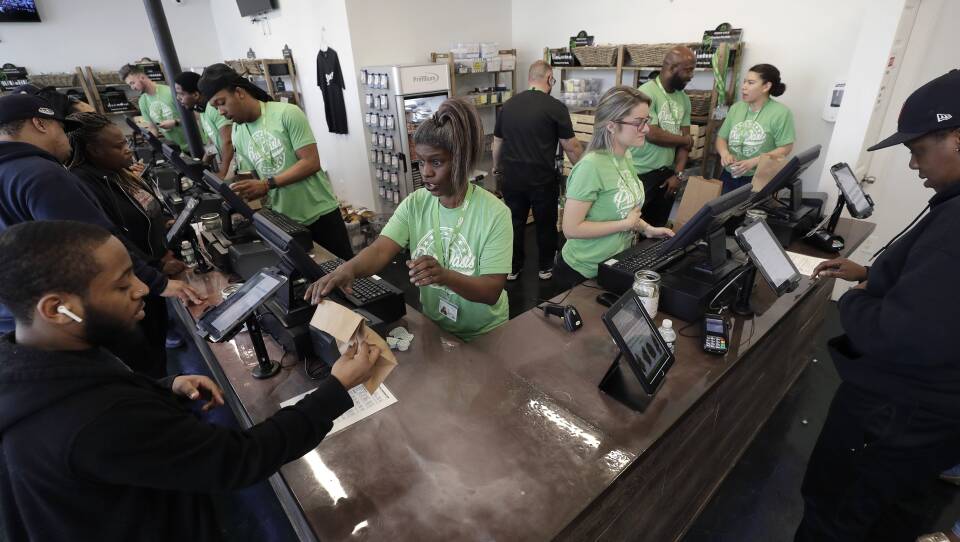In January, Nicole Obi was appointed president and CEO of Black Economic Council of Massachusetts (BECMA), which supports Black-owned businesses and communities throughout the state. Last week, it announced that it had given funds so that all graduating seniors from the Dearborn STEM Academy in Roxbury would be admitted to a two-year program at the Benjamin Franklin Cummings Institute of Technology. Obi joined GBH Morning Edition host Paris Alston to talk about how the organization’s aims to close the racial wealth gap.
Paris Alston: So, Nicole, you come to this position as a former entrepreneur, you ran a strategy consulting firm where you worked with everyone from venture capitalists to Fortune 100 companies. But as I understand, you didn't get much business from your home state of Massachusetts when you ran that firm. Tell me more about that experience.
Nicole Obi: Yeah, it's true. I had one Massachusetts-based client, a Black woman. Her name is Bennie Wiley. At the time she was running the partnership. All of my other clients over that seven-year term were from outside of the state, and a lot of that came through word of mouth going from one client to the next client, and try as I may, I wasn't able to get any other Massachusetts-based clients besides Bennie Wiley. So it’s little disappointing, especially because I was doing great work at the time.
Alston: And what did that tell you about the state of Black-owned business in Massachusetts?
Obi: I figured that if I was having such a hard time just based on the type of work that I was doing, which I thought was very much aligned to the innovation economy, if I couldn't get support and clients within Massachusetts, it must be really difficult for other Black entrepreneurs and business owners.
Alston: Zooming in to Boston. I want to do that just because the city has launched an initiative to revive Boston and its businesses and activities and all the things that make the city what it is as it recovers from the pandemic. How does an organization like BECMA make sure that Black-owned businesses are included in that plan?
Obi: A big part of what BECMA does is to advocate for our community, whether it's residents, whether it's business owners, and we certainly do that with cities across the commonwealth and city of Boston in particular. We currently have a lawsuit against the city of Boston because over the last five-year period, the city spent less than one percent on Black-owned businesses. We're happy that our former President of BECMA, Segun Idowu, is now serving in the Wu administration as the chief of opportunity and inclusion. But we're still going to push forward with policy and advocacy around getting the needed support around capital and resources for our businesses within the city of Boston.
Alston: You've mentioned the city's lack of contracts with Black-owned businesses. Another sticking point in Boston has been liquor licensing. The Boston City Council has announced a push to get more liquor licenses specifically for the neighborhoods of Dorchester, Roxbury and Mattapan, which are highly concentrated with people of color so that those businesses can compete with the rest of the city. Tell me more about what it means for a business to have a liquor license. Why is that vital to their success?
Obi: Liquor licenses are game changers for restaurants and other businesses, and I'm thrilled that there's an effort to get more licenses. We also have to be mindful that those licenses cost hundreds of thousands of dollars often, and we want to make sure that our businesses not only have an opportunity to vie for those licenses, but they're getting the support to actually be able to afford to get them so that they can really take their businesses to the next level.
"If Massachusetts can close its racial wealth gap, the state economy will grow by $25 billion in just five years. So doing this work is good for Black people and it's good for all of us in the commonwealth."-Nicole Obi, BECMA President and CEO
Alston: In a recent Boston Globe article, Boston City Councilor Brian Whorl cited Mattapan, for instance, as having only 10 out of the city's more than 1,400 liquor licenses, but only two of those licenses are in use. So why might a restaurant who has a liquor license might not be using it?
Obi: I'm not sure about those cases, so I can't speak to why they're not being used.
Alston: Once a business would get something like a liquor license — are there other supports that are needed to be able to help that business thrive?
Obi: Oftentimes, besides being able to afford to purchase these licenses, then there's need for the restaurateurs and in many cases, to be able to build out their facilities to hire the staff and to do all the working capital type of investments that are needed to scale their businesses and operate their businesses at another level. And so there's wraparound and other types of support services that are needed. And many of our business owners, that's just more money that they don't have access to.
Alston: I also want to ask you about marijuana businesses, Black-owned marijuana businesses in Massachusetts, because the State Senate just passed a bill to try to remove those racial and economic barriers to entry in the state's marijuana industry. Tell me a little bit about how BECMA has been working on that front.
Obi: BECMA is advocating for cannabis equity. The cost of getting into this space is so high that it prohibits most Black-led businesses and entrepreneurs from getting into this space. And so we are advocating for access to capital in cannabis equity. And we are holding it as one of our primary growth areas for our members across the commonwealth.
Alston: And lastly, Nicole, what is your hope for the future of Black-owned businesses in the commonwealth?
Obi: My hope is that we will be able to close the racial wealth gap by giving these businesses and these students and these homeowners the support that they need. If Massachusetts can close its racial wealth gap, the state economy will grow by $25 billion in just five years. So doing this work is good for Black people and it's good for all of us in the Commonwealth.








